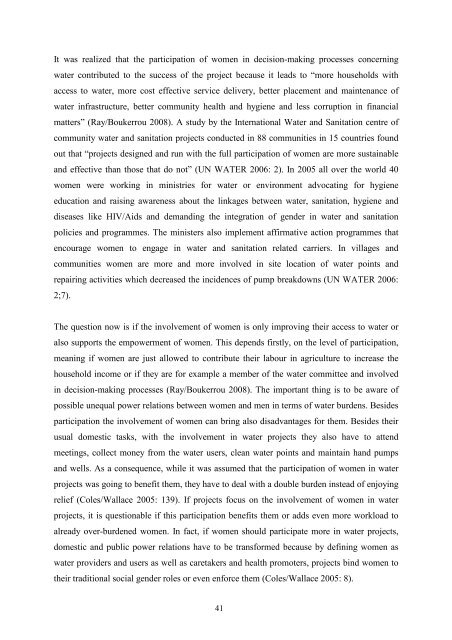DIPLOMARBEIT - ÖH Uni Wien - Universität Wien
DIPLOMARBEIT - ÖH Uni Wien - Universität Wien
DIPLOMARBEIT - ÖH Uni Wien - Universität Wien
Create successful ePaper yourself
Turn your PDF publications into a flip-book with our unique Google optimized e-Paper software.
It was realized that the participation of women in decision-making processes concerningwater contributed to the success of the project because it leads to “more households withaccess to water, more cost effective service delivery, better placement and maintenance ofwater infrastructure, better community health and hygiene and less corruption in financialmatters” (Ray/Boukerrou 2008). A study by the International Water and Sanitation centre ofcommunity water and sanitation projects conducted in 88 communities in 15 countries foundout that “projects designed and run with the full participation of women are more sustainableand effective than those that do not” (UN WATER 2006: 2). In 2005 all over the world 40women were working in ministries for water or environment advocating for hygieneeducation and raising awareness about the linkages between water, sanitation, hygiene anddiseases like HIV/Aids and demanding the integration of gender in water and sanitationpolicies and programmes. The ministers also implement affirmative action programmes thatencourage women to engage in water and sanitation related carriers. In villages andcommunities women are more and more involved in site location of water points andrepairing activities which decreased the incidences of pump breakdowns (UN WATER 2006:2;7).The question now is if the involvement of women is only improving their access to water oralso supports the empowerment of women. This depends firstly, on the level of participation,meaning if women are just allowed to contribute their labour in agriculture to increase thehousehold income or if they are for example a member of the water committee and involvedin decision-making processes (Ray/Boukerrou 2008). The important thing is to be aware ofpossible unequal power relations between women and men in terms of water burdens. Besidesparticipation the involvement of women can bring also disadvantages for them. Besides theirusual domestic tasks, with the involvement in water projects they also have to attendmeetings, collect money from the water users, clean water points and maintain hand pumpsand wells. As a consequence, while it was assumed that the participation of women in waterprojects was going to benefit them, they have to deal with a double burden instead of enjoyingrelief (Coles/Wallace 2005: 139). If projects focus on the involvement of women in waterprojects, it is questionable if this participation benefits them or adds even more workload toalready over-burdened women. In fact, if women should participate more in water projects,domestic and public power relations have to be transformed because by defining women aswater providers and users as well as caretakers and health promoters, projects bind women totheir traditional social gender roles or even enforce them (Coles/Wallace 2005: 8).41


